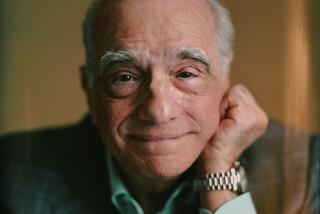Review: ‘Exodus’ follows its own path
- Share via
“Exodus: Gods and Kings” is one film where spoiler alerts aren’t necessary. Both the Bible and the big screen have so prominently featured the story of fearless prophet Moses and hard-hearted Pharaoh’s refusal to let his people go that the events depicted in this latest reenactment will not be news to anyone.
But that familiarity doesn’t mean there aren’t surprises to be had, and not always welcome ones. Gone, gone, gone is the traditional depiction of the Almighty as an unseen voice in the clouds: A snarky, querulous 11-year-old boy gets the call instead.
Even more unsettling, the Red Sea doesn’t dramatically part the way we’ve gotten used to; it just kind of fades away, only to come roaring back when no one is expecting it. Some nerve.
As directed by Ridley Scott and starring Christian Bale as Moses and Australian star Joel Edgerton as the unbending Pharaoh Ramses, “Exodus” is a film determined to stubbornly go its own way whenever it can.
In this, as written by a tribe of writers including Adam Cooper and Bill Collage and Jeffrey Caine and Steven Zaillian, it echoes its own storyline where each major character, including the Almighty, is more stubborn than the one who came before.
At its core, however, “Exodus” is the kind of traditional adventure epic that we’ve come to expect from director Scott, responsible at his best for “Blade Runner,” “Alien,” “Gladiator” and the underrated “Kingdom of Heaven.”
Scott is in many ways contemporary cinema’s preeminent creator of exotic worlds, and working here with his frequent production designer Arthur Max, cinematographer Dariusz Wolski and an art and construction crew numbering more than 1,000, he has turned the spectacle of ancient Egypt into the film’s most plausible reason for being.
Making extensive use of computer-generated imagery as well as 3-D (which, frankly, takes some getting used to), “Exodus” is heavily into pharaonic color and pageantry, giving us charging chariots, seething crowds, warring armies, the whole nine yards, often viewed from a god’s eye overhead perspective.
Despite the best efforts of all those writers, however, the dramatic side of “Exodus” alternates between being completely solemn and unintentionally silly, with lines of dialogue like a snarky Aaron telling his son, “This is your famous uncle Moses” being more the rule than the exception.
In this it is not as far as it thinks from the gold calf standard of biblical epics, “The Ten Commandments,” a story that Cecil B. DeMille liked so much he filmed it twice. As with the DeMille ventures, enjoyment here involves managing expectations and not taking things too seriously.
It all begins, a helpful opening title tells us, in 1300 BCE, a time when the Hebrews had been slaves in Egypt for 400 years but had not forgotten either their homeland or their god. And, fortunately, “god has not forgotten them” either.
Off we go to a palace in Memphis, where Seti (an incongruous John Turturro heavily invested in eyeliner) is the Pharaoh in charge. A priestess is reading entrails and announces to general disinterest that “a leader will be saved and a savior will one day lead.”
Listening with half an ear are two men who were raised as brothers, the edgy but pragmatic Moses (a hard-working Bale) and Seti’s son and heir, Ramses (Edgerton), whose sullen, thuggish demeanor gives him the air of a soccer hooligan and telegraphs his future peevishness.
Both men go off to battle the Hittites (remember them?), and then Moses goes down to Pithom, ground zero for Hebrew slave labor, where depraved viceroy Hegep (Ben Mendelsohn) is fed up with the Hebrews, whom he calls “a conniving people” and worse.
Someone who believes “you can tell a lot about someone by looking them in the eye” (who knew?), Moses decides to interview some Hebrews himself, and one of them, the scholarly Nun (Ben Kingsley) drops a bombshell: Moses is a Hebrew himself, and God just might have something in store for him.
Back in Memphis all hell breaks loose at this news, and Moses finds himself exiled into a trackless desert, where he just happens to run across a fetching nomadic shepherdess named Zipporah (Spanish actress Maria Valverde) and ends up a happily married husband and father.
God, however, has other plans for Moses, including appearing to him as that 11-year-old boy (Isaac Andrew), an idea that sounds intriguing in theory but is ineffective in practice, as deity and prophet bicker constantly over Moses’ reluctance to accept his destiny as well as the Almighty’s Hebrew liberation strategy. It’s not a pretty picture.
Finally, God ends the argument by bringing on the 10 plagues, which include elements, like an attack by giant ravenous crocodiles, that may not be familiar to the devout. But Scott is nothing if not a master orchestrator of chaos, and, both intentionally and otherwise, “Exodus: Gods and Kings” offers plenty of that.
------------
‘Exodus’
MPAA rating: PG-13 for violence including battle sequences and intense images
Running time: 2 hours, 29 minutes
Playing: In general release
More to Read
Only good movies
Get the Indie Focus newsletter, Mark Olsen's weekly guide to the world of cinema.
You may occasionally receive promotional content from the Los Angeles Times.











